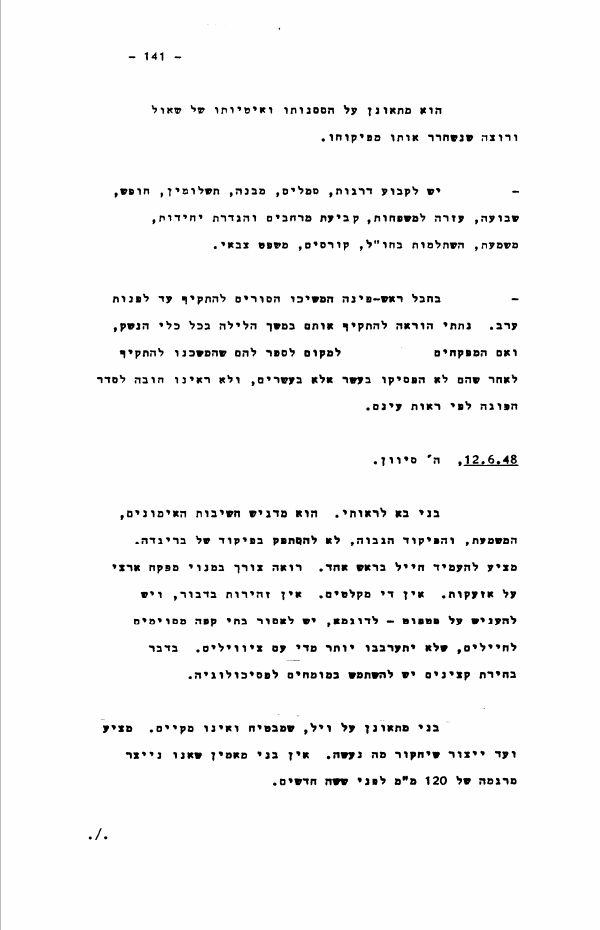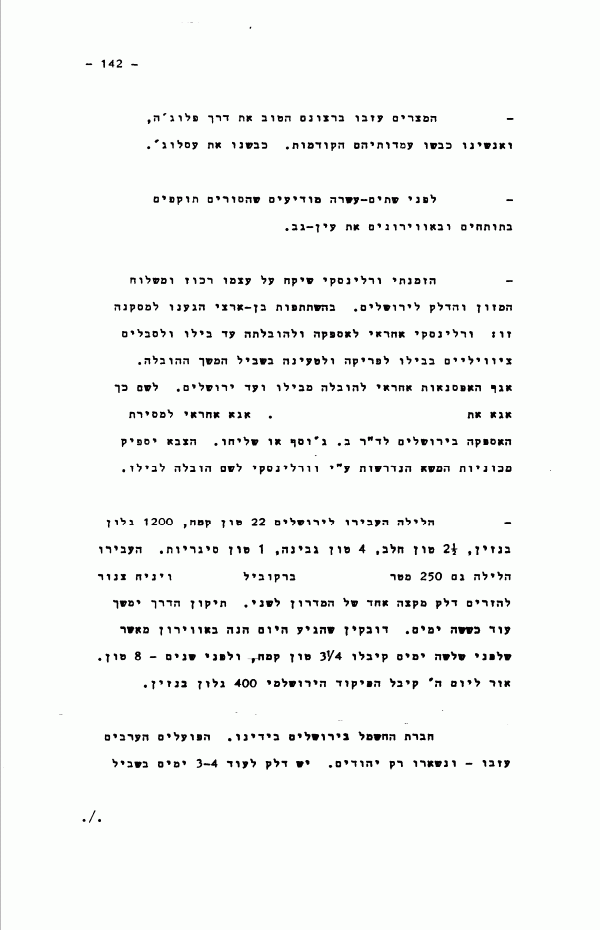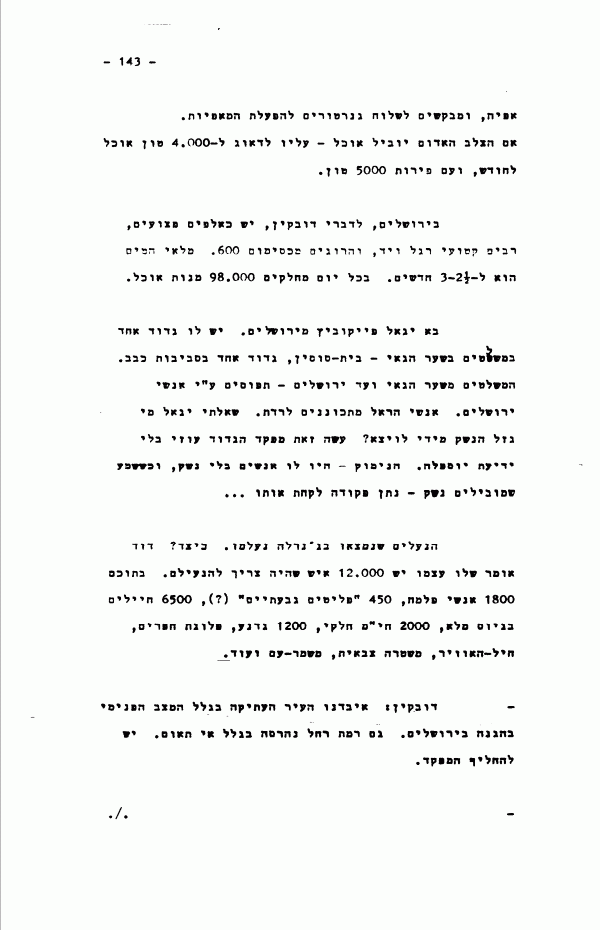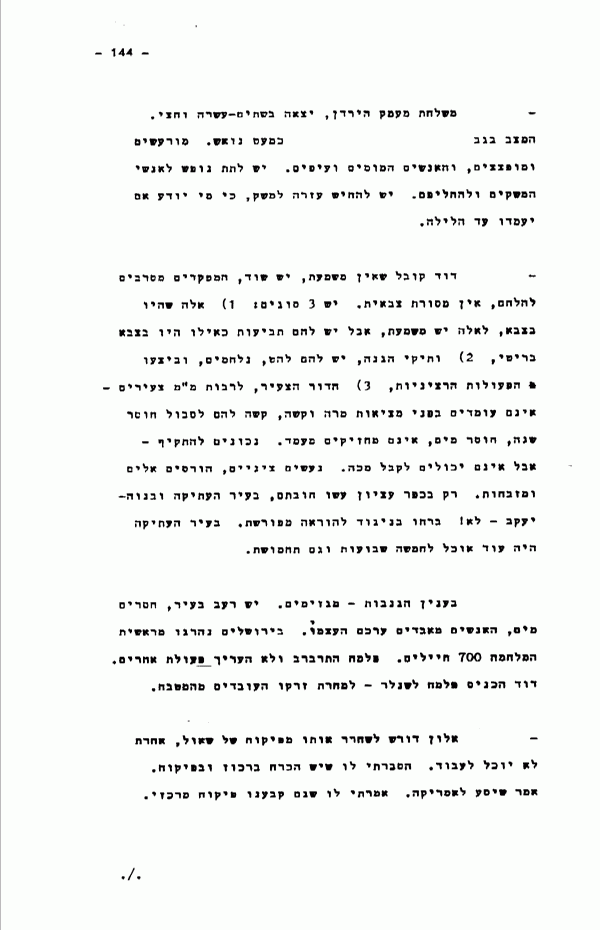[Saturday,] June 12, 1948
Benny [Dunkelman] came to see me. He stresses the importance of training, discipline, and the High Command. Not to make do with brigade command. [He] proposes placing [an experienced] soldier at the head of the Training Department.
[He] thinks it's necessary to appoint a countrywide supervisor for the [air-raid] alarms. There aren't enough shelters. People aren't cautious about speaking, and chatter should be punished - for example. Certain coffee shops should be prohibited to soldiers, so that they don't mix too much with civilians. In selecting officers [we] should use experts in psychology.
Benny complains about Vilenchuk promising and not doing. Proposes a production committee to investigate what's happening. Benny doesn't believe that we'll produce a 120 mm mortar within six months.
- The Egyptians left the Faluja road willingly, and our men captured their former positions. We captured ''Asluj.
Before twelve [we] receive news that the Syrians are attacking ''Ein Gev with cannons and planes.
- I summoned [Nahum] Warlinski [sp.] [of Tnuva], to take upon himself the coordination and delivery of food and fuel to Jerusalem. With Ben-Artzi's participation we reached this conclusion: Warlinski is responsible for supplies and their transport up to [Camp] Bilu, and for civilian porters at Bilu to do the unloading and loading for the continuing transport. The Logistics Department is responsible for transport from Bilu to Jerusalem. Towards this end the Logistics Department is appointing … [no one was named at the time; in time Ber Shemer was appointed]. The Logistics Department is responsible for delivering the supplies in Jerusalem to Dr. Bernard Joseph or his envoy. The army will provide the trucks Warlinski needs for transport to Bilu.
During the night 22 tons of flour, 1,200 gallons of gasoline, 12½ tons of milk, 4 tons of cheese, 1 ton of cigarettes were delivered to Jerusalem. 250 m of 2" piping was also delivered to Jerusalem during the night, and we'll lay piping so that fuel flows from one end of the slope to the other. The road repair will take about another six days.
[Eliahu] Dobkin [of the Jewish Agency Executive], who arrived here [from Jerusalem] by plane, confirms that three days ago they received 3[½] tons of flour, and two [days] ago - 8 tons. Early Thursday the Jerusalem command received 400 tons of gasoline.
The electric company in Jerusalem is in our hands. The Arab workers left - and only Jews remained. There's fuel for another 3-4 days for baking, and they're asking for generators to be sent to operate the bakeries. If the Red Cross transports food - it will have to ensure 4,000 tons of food per month, and with fruit 5,000 tons.
In Jerusalem, according to Dobkin, there are about 2,000 wounded, many with a severed foot or hand, and a maximum of 600 killed. The water supply is for 2½-3 months. Each day 98,000 food rations are distributed.
Yigal Peikowitz [Allon] arrived from Jerusalem. He has one battalion in the strongholds at Sha'ar HaGai - Beit Susin [the 4th Battalion], one battalion around Qubab [the 1st Battalion]. The strongholds from Sha'ar HaGai to Jerusalem - are being held by Jerusalem men [from the Etsiyyoni Brigade].
Harel men are planning to come down [leave Jerusalem].
I asked Yigal who'd swiped the weapons from Levitze.
It was battalion commander Uzi [Narkis] without the knowledge of Yosef-le [Tabenkin, brigade commander]. The excuse - he had men without weapons, and when he heard that weapons were being transported - he gave in order to take them …
The shoes that were stored in the Generali [on Jaffa Street, within "Bevingrad" - security zones established by the British and captured on May 14 by the IZL] have disappeared. How? David [Shaltiel] says that he personally has 12,000 men who needed shoes, including 1,800 Palmach men, 150 Givati refugees [troops who remained cut off] (?), 6,500 fully enlisted soldiers, 2,000 partially [enlisted] garrison [troops], 1,200 Gadna, [Youth Battalions] a [trench] diggers' company, air force, military police, People's Guard, etc.
- [Eliahu] Dobkin: We lost the Old City because of the internal situation in the Haganah in Jerusalem. Ramat Rahel, too, was destroyed due to lack of coordination. The commander should be replaced.
- A delegation from Emek HaYarden set out at 12:30: The situation in [''Ein] Gev is almost desperate. They're being shelled and bombed, and the people are shellshocked and worn out. Leave should be given to the people from the settlements [from the surrounding area, who reinforced ''Ein Gev] and they should be replaced. Aid should be rushed to the settlement, because who knows whether they'll last until night.
- David [Shaltiel] complains that there's no discipline, there's theft, the commanders are refusing to fight, there's no military tradition. There are three types: 1) Those who've been in the army; they have discipline, but they make demands as if they were in the British army. 2) Experienced Haganah fighters; they have passion, they fight, and they carried out the serious actions. 3) The younger generation, including young platoon commanders - they can't withstand a harsh, bitter reality. It's hard for them to endure lack of sleep, lack of water; they're not holding on. They're prepared to attack - but can't suffer a blow. They become cynical, destroying gods and altars [i.e., "slaughtering sacred cows" (presumably)]. Only in Kefar Etsiyyon did they fulfill their duty. In the Old City and Neve Ya'akov - not! They fled, disobeying a direct order. In the Old City there was food for another five weeks as well as munitions.
On the matter of thefts - [they're] going too far. There's hunger in the city, lack of water, people are losing their self-esteem. In Jerusalem 700 soldiers have been killed since the start of the war. The Palmach was boastful and devalued the efforts of others. David brought the Palmach to Schneller [camp] - and on the following day they threw the workers out of the kitchen.
- Alon [Yehuda Arazi] is demanding to be released from Shaul's supervision, otherwise he won't be able to work. I explained that it's necessary to have centralization and supervision. He said he would assist [with procurement] in America. I told him that we've established centralized supervision there as well.












